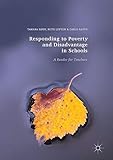Responding to Poverty and Disadvantage in Schools [electronic resource] : A Reader for Teachers / by Tamara Bibby, Ruth Lupton, Carlo Raffo.
Material type: TextPublisher: London : Palgrave Macmillan UK : Imprint: Palgrave Macmillan, 2017Description: XI, 218 p. online resourceContent type: text Media type: computer Carrier type: online resourceISBN: 9781137521569Subject(s): Education | Educational policy | ducation and state | Educational sociology | Teaching | Education and sociology | Sociology, Educational | Education | Sociology of Education | Educational Policy and Politics | Schools and Schooling | Sociology of Education | Teaching and Teacher EducationAdditional physical formats: Printed edition:: No titleDDC classification: 306.43 LOC classification: LC189-214.53Online resources: e-book Full-text access
TextPublisher: London : Palgrave Macmillan UK : Imprint: Palgrave Macmillan, 2017Description: XI, 218 p. online resourceContent type: text Media type: computer Carrier type: online resourceISBN: 9781137521569Subject(s): Education | Educational policy | ducation and state | Educational sociology | Teaching | Education and sociology | Sociology, Educational | Education | Sociology of Education | Educational Policy and Politics | Schools and Schooling | Sociology of Education | Teaching and Teacher EducationAdditional physical formats: Printed edition:: No titleDDC classification: 306.43 LOC classification: LC189-214.53Online resources: e-book Full-text access | Item type | Current library | Collection | Call number | Copy number | Status | Notes | Date due | Barcode |
|---|---|---|---|---|---|---|---|---|
| E-Books | MEF eKitap Kütüphanesi | Springer Nature | LC189 -214.53 (Browse shelf (Opens below)) | Available | NATURE | 1419614-1001 |
Chapter 1. Introduction -- Chapter 2. Disengagement -- Chapter 3. Confrontational Behaviour -- Chapter 4. Culture Clashes -- Chapter 5. Language and Communication Difficulties -- Chapter 6. Government Policies in Practice -- Chapter 7. Being a Teacher in a Disadvantaged Area -- Chapter 8. Schools and Their Communities -- Chapter 9. Beyond the Mainstream Classroom -- Chapter 10. The Vignettes as a Whole -- Chapter 11. Conclusions.
This book explores a range of challenges teachers face in dealing with situations of disadvantage, and explores different ways of thinking about these situations. Starting with a variety of incidents written by teachers in schools in disadvantaged settings, the book provides a range of ways of thinking about these - some more psychological, others more sociological - and chapters develop conversations between teachers and academics. These 'conversations' will help teachers reflect more deeply on the contexts in which they work, on what disadvantage means, and how disadvantage manifests in practice. It will also help teachers reflect upon the nature of their work; what it means to be a good and effective teacher; and the particular skills, approaches, relationships and competencies that may need to be developed in differing settings of educational disadvantage. The book explores the tensions between different ways of thinking about education and disadvantage; it will make compelling reading for students and teachers of education, education policy makers, and practising schoolteachers.
5
